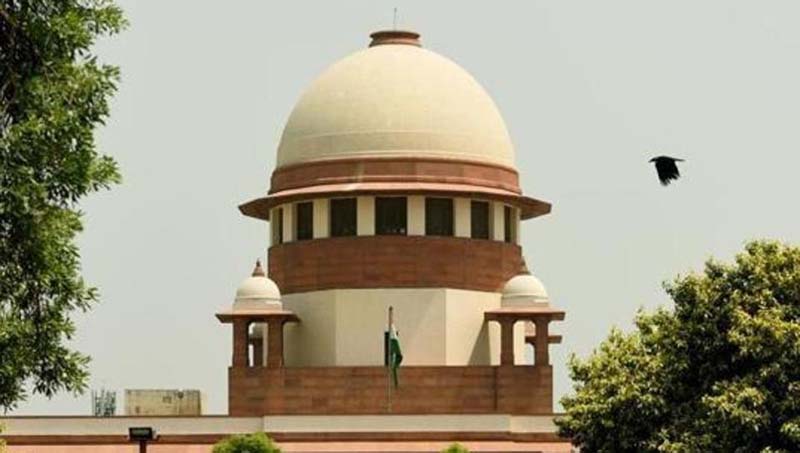Hearing in Ist week of Oct
NEW DELHI, Aug 28: The Centre’s decision to change the Constitutional status of Jammu and Kashmir came under the legal scrutiny today with the Supreme Court referring a batch of pleas against the abrogation of Article 370 for hearing in first week of October by its five-Judge bench.
The petitioners have challenged the Jammu and Kashmir Reorganisation Act, 2019 and the Presidential Orders that followed. Click here to watch video
The top court issued notices to the Centre and the State administration and sought their response on the issues raised in the petitions that the legislation and the Presidential Orders are “illegal and violative” of the Fundamental Rights guaranteed under Articles 14 and 21 of the Constitution to the people of Jammu and Kashmir.
A bench headed by Chief Justice Ranjan Gogoi did not agree with the Centre that there was no need for issuing notices in the matter as Attorney General K K Venugopal and Solicitor General Tushar Mehta were marking their presence in the court.
“We will refer the matter to a 5-Judge Constitution bench,” said the bench, also comprising Justices S A Bobde and S A Nazeer. It did not accept the argument that notices would have a “cross-border repercussion”.
The AG, who was of the view that the notice should not be issued while referring the matter to the Constitution bench, said deliberations here on Article 370 would be taken to the United Nations.
He was apparently hinting that the attention of the UN would be drawn to the hearings here by those who are opposing the Centre’s decision, including the neighbouring country.
As the counsel appearing for both the sides were involved in arguments and counter-arguments, the bench said, “We know what to do, we have passed the order, we are not going to change.”
The first petition, challenging the Presidential order on scrapping of provisions in Article 370, was filed by advocate M L Sharma who was later joined by another lawyer, Shakir Shabir, from the State.
National Conference, the State’s prominent political party, filed a petition on August 10, contending that the changes had taken away the rights of J&K citizens without their mandate.
Arguing that the legislation approved by Parliament and the orders issued by the President subsequently were “unconstitutional”, the petition sought they be declared “void and inoperative”.
The petition was filed by NC’s Lok Sabha MPs Mohammad Akbar Lone and Justice (retd) Hasnain Masoodi. Lone is a former speaker of the J&K Assembly and Masoodi a retired Judge of the Jammu and Kashmir High Court. In 2015, he had ruled that Article 370 was a permanent feature of the Constitution.
Other pleas include the one filed by a group of former defence officers and bureaucrats. They have also sought directions declaring the Presidential orders of August 5 “unconstitutional, void and inoperative”.
The plea was filed by professor Radha Kumar, a former member of the Home Ministry’s Group of Interlocutors for Jammu and Kashmir (2010-11), former IAS officer of J&K cadre Hindal Haidar Tyabji, Air Vice Marshal (retd) Kapil Kak, Major General (retd) Ashok Kumar Mehta, former Punjab-cadre IAS officer Amitabha Pande and former Kerala-cadre IAS officer Gopal Pillai, who retired as the Union Home Secretary in 2011.
A petition has also been filed by bureaucrat-turned-politician Shah Faesal, along with his party colleague and former Jawaharlal Nehru University Students’ Union (JNUSU) leader Shehla Rashid.
There are other petitions challenging the Centre’s decision on Article 370.
The Apex court today listed 11 petitions connected with Article 370 and issues arising after its abrogation.
The NC leaders submitted that the Presidential Orders paved the way for application of entire provisions of the Constitution in Jammu and Kashmir and also have the effect of nullifying Article 35A and completely abrogating Article 370.
While challenging the Centre’s decisions to scrap provisions of the Article 370 that accorded special status to Jammu and Kashmir, and dividing it into two Union Territories, the two MPs have sought a direction to declare the Act and the Presidential Orders as “unconstitutional, void and inoperative”.
They submitted that the Apex Court now has to examine whether the Union Government can “unilaterally” unravel the unique federal scheme under the cover of President’s rule while undermining crucial elements of due process and rule of law.
“This case, therefore, goes to the heart of Indian federalism, democratic processes and role of the Apex Court as the guardian of the federal structure,” the petition said.
They submitted that Article 370 was extensively considered as carefully drafted in order to ensure the peaceful and democratic accession of the former princely State of Jammu and Kashmir to the Indian Union.
The two contended that the Presidential Orders and the new legislation unconstitutionally undermine the scheme of Article 370.
The first Presidential Order uses Article 370 (1)(d) — this was meant to apply other provisions of the Constitution to Jammu and Kashmir — to alter Article 370 itself and thereby the terms of federal relationship between the J-K and Union of India, they submitted. (PTI)


